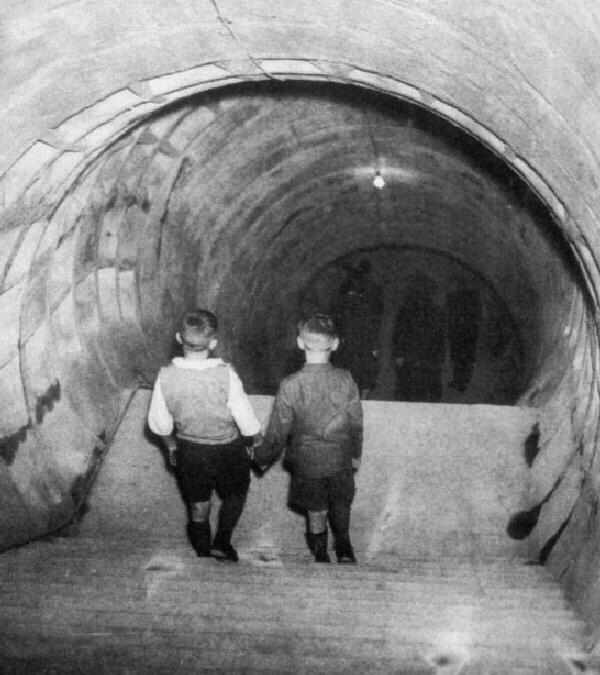
Battle of Britain: Outcome--Civilian Morale

Figure 1.--No one knew before the War what the effect of bombing on cvivilan populations would be. Hitler assumed that he could crack civilian morale and force British leaders to the conference table. He proved disastrously wrong. The civilian population stucjk it out. Here are two little London descending into the Tube (subway) as it began to get dark and a Luftwaffe force approached for another night of bombing. Notice how they are holding hands for comfort. Not all London children were evacuated. Most did not want to go and many mothers could not bear to part with them.
|
World War end before military avialtion had developed to the point that a strategic bombing campaign could be waged. German Zephlin attacks on Britain were ineffective. Both sides were preparing bombing campaigns in 1919, but the war ended before they were launched. Milutary strategists debated the potential impact of strategic bombing.- At the time of the Blitz no one knew the potential impact of bombing in warfare. Hitler assumed that bombing civilian populations would crack any opponent. The British people demonstrated that a prepared civilian population supported by an effective air force would not crack. It would be a lesson that the British and Americans would take some time to learn over the skies of northern Europe. British officials at the onset of the War had questioned bombing war industries because it meant the destruction of private property. No one in Briton after the Blitz was asking these countries. Rather than a population cowering and pleading for peace, Hitler created a civiluian population willing to whatwver sacrifices were needed for victory and a population supporing a Government prepared to wage war with the sanme ferocity that the NAZIs had demonstratred.
World War I (1914-18)
World War I saw the first extensive use of air planes in warfare. The War ended, however, before military avialtion had developed to the point that a strategic bombing campaign could be waged. German Zephlin attacks on Britain were ineffective, but terrorized British civilians. Both sides were preparing bombing campaigns in 1919, but the war ended before they were launched.
Inter-War Debate (1918-39)
Milutary strategists debated the potential impact of strategic bombing.
Proponents of air war argued that wars could be won by destroying the war industriesof opponents. Both Britian and America gave more attention to building bombers than fighters. The new German Luftwaffe reached a different conclusion and decided to build a tactical airforce, concentrating on fighters and light or medium bombedrs. The Loyalists used bombers to attack Republican cities during the Spanish Civil War. Here the new Luftwaffe planes were tried out (1936-39). They terrified Europe, but did not settle the question of the potential impact of bombing and the affect on civilians. The threat was, however, a threat in the Czechs deciding not to fight the Germans (1938).
World War II (1939-40)
At the time of the Blitz no one knew the potential impact of bombing in warfare. Hitler assumed that bombing civilian populations would crack any opponent. The Luftwaffe forced Warsaw to surender before it was actually taken by ground forces (September 1939). The Luftwaffe also convinced the Dutch to surrender after Totterdam was bombed (May 1940). France surrendered before its cities were heavily bombed (June 1940). The threat of bombing and the destruction of French cities was a factor in the French deciding to sign an armistace.
The determinnation of the British to resist Hitler is often ascribed to the British character. This may have been a factor, but we believe that the Channel which stopped the Wehrmacht and preparations made by the British Government may have been even more important factor. The British people demonstrated that a prepared civilian population supported by an effective air force would not crack, even under prolonged bombardment. This would be a lesson that the British and Americans would take some time to learn over the skies of northern Europe. British officials at the onset of the War had questioned bombing war industries because it meant the destruction of private property. No one in Briton after the Blitz was asking these countries. Rather than a population cowering and pleading for peace, Hitler created a civiluian population willing to whatwver sacrifices were needed for victory and a population supporing a Government prepared to wage war with the same ferocity that the NAZIs had demonstratred. The British after the fall of France was left with aerial bombardment as the only wat to strike Germany. The bombing was seen as playing an important part in winning the War, but British civilians heavily supported the air bar as a way of paying the Germans back.
HBC

Navigate the Boys' Historical Clothing Web Site:
[Return to Main Battle of Britain outcome page]
[Return to Main World War II page]
[Introduction]
[Activities]
[Biographies]
[Chronology]
[Clothing styles]
[Countries]
[Bibliographies]
[Contributions]
[FAQs]
[Glossaries]
[Satellite sites]
[Tools]
[Boys' Clothing Home]
Created: 4:45 AM 9/27/2005
Last updated: 2:22 AM 10/4/2005



